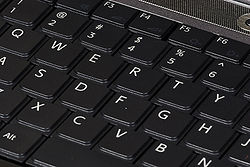Can Apple overcome the Tablet PC's one Achilles' heel: The keyboard?

Apple tablet (iTablet? iSlate?) rumors are flying left, right and center. On top of that I'm being asked questions about the device that given the information that we know for sure about the device (almost nothing) I can't possibly answer. Assuming that Apple does have a tablet up its sleeve, there's one thing more than anything else that I'm interested in seeing, and that's how Apple sort out the keyboard.

QWERTY. Love it or hate it (and if you hate it, try using a keyboard laid out alphabetically instead, that's truly hell), it continues to define what we think of as being a keyboard. Designed in 1874 as a way to overcome issue with mechanical typewriters, it's still considered today by may to be the only way of arranging a keyboard.
Over the years I've used a LOT of devices, but I've seen little innovation when it comes to character input. There's the traditional keyboard, which works very well indeed but is a mechanical device that requires a certain amount of space. Sure, you can shrink down the keyboard to the point where the keys are far smaller than fingertips (my Nokia E71 for example) and still make it usable, but that shrinking puts a crimp in both comfort and typing speed.
Touchscreen technology first gave us on-screen keyboards that we could use with a stylus, and then with out fingertips. Both work, but are far from ideal. Even the keyboard on the iPhone is only ideally suited to limited typing. The problem is partly down to the fact that the keyboard is cramped, but a bigger problem with on-screen keyboards no matter what the size is that you are typing on a sheet of glass that offers no physical kinesthetic feedback.
Next -->
Then there are fringe technologies such as laser keyboards. These devices look cool, but are again only really suited to limited input.
Another option is to augment a touchscreen keyboard with other technology, such as handwriting recognition or voice recognition. Both technologies have been around for some time, but neither have, as yet, gone mainstream.
The keyboard is a tough thing to reinvent. So, what will Apple do?
The most popular Apple tablet rumors seem to suggest that the device will be basically an iPhone, only bigger. That wild guess leads to other wild guesses, such as the keyboard being the same as what we have on the iPhone, only bigger. If that's the case then Apple's tablet is likely to be a device aimed at content consumers who only need to input limited data (URLs, usernames, passwords, credit card details ...) rather than a portable computer that you might see at work or college.
Bottom line, we don't know, and that means that whatever tablet Apple comes out with could bring with it some reinvention of the keyboard. With the iPhone Apple didn't really need to come up with anything truly revolutionary because cellphone keyboards are all pretty primitive and used in a limited way. With a tablet the stakes are raised significantly, which means that if Apple does simply just scale up the iPhone keyboard, I'll be disappointed.
The problem with whatever solution that Apple comes out with for the tablet is that initially it'll be hard to separate hyperbole from reality. With the iPhone, there was an awful lot of claims made for the keyboard that turned out to be, to put it lightly, exaggerations. The iSlate of iTablet or whatever it ends up being called could have a keyboard specifically designed for unicorns to use with their horn and it'll be marketed as a one size fits all solution. And when it comes to keyboard, both history and the current market proves that this isn't so.
Like I said, the keyboard is a tough thing to have to reinvent.
<< Home >>